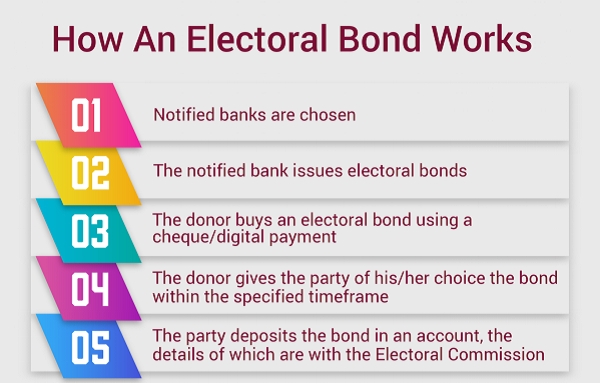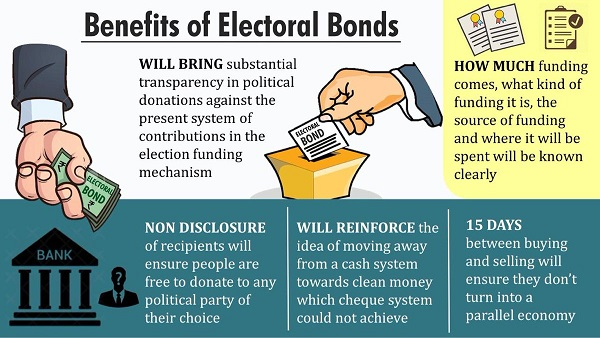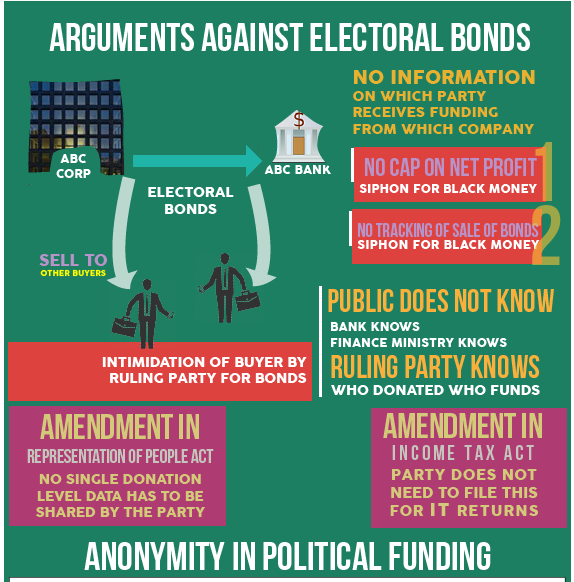Description

Copyright infringement not intended
In News
- According to the State bank of India data “Donations to political parties through Electoral Bonds have crossed the Rs 10,000-crore mark since 2018”.
- This information was given by the State Bank of India (the only bank authorized to sell these bonds) in a reply to the RTI application.
Electrol Bonds
- The Electoral bonds were introduced with the Finance Bill (2017).
- The Union Government has notified the detailed guidelines about the Electoral Bonds Scheme in January 2018, with the objective to cleanse the system of political funding in the country.
- The Electoral Bond is a bearer instrument like a Promissory Note and an interest-free banking instrument.
- A bearer instrument is a document that authorizes the holder with the right of ownership or title of the property, such as Currency, shares or bonds.
- Unlike normally registered instruments, no record is kept about the owners of bearer instruments or the transfer of ownership.
- Whoever physically holds the bearer document is assumed to be the owner of the property.
- Electoral bonds may be purchased by a person, who is a citizen of India or established in India.
- An individual can buy electoral bonds either singly or jointly with other individuals.
- The Electoral Bond does not carry the name of the payee.
- Electoral bond would be issued/purchased for any value, in multiples of Rs 1,000 from the specified branches of the State Bank of India (SBI).
- Electoral Bonds have a validity of 15 days.
- Political parties registered under Section 29A of the Representation of the People Act, 1951 and also secured a minimum of 1% of voters polled in the last general election to the House of the People or the Legislative Assembly of the State are eligible to receive electoral bonds.
- The Electoral Bonds shall be available for purchase for 10 days each in January, April, July and October, as may be specified by the Central Government.
- An additional period of 30 days shall be specified by the Central Government in the year of the General election to the House of People.
- Electoral Bonds can be encashed by an eligible political party only through their bank accounts with the authorised bank.
- The bonds do not have the name of the donor or the receiving political party.
- It only carries a unique hidden alphanumeric serial number as an in-built security feature.
- Electoral bonds protect the identity of political donors and parties receiving contributions.
- Donors who contribute less than Rs 20,000 to political parties through the purchase of electoral bonds need not provide their identity details such as PAN, etc.
Finance Bill (2017)
- Before the bill came into force;
- A company donating to a political party could contribute a maximum of 7.5% of the average net profits in the last three financial years.
- It was required to disclose the details of the contributions made to any political parties along with the name of the political parties to which such contributions were made.
- The Finance Bill (2017) introduced new provisions;
- It removed the maximum limit set on the companies for donations to political parties, now there is no limit on companies for donating to political parties.
- It also removed the requirement for a company to disclose the name of the political parties to which it was donating.
- The bill adds that "contributions will have to be made only through a cheque, bank draft, electronic means, or any other scheme notified by the government to make contributions to political parties."
Arguments in favour of Electoral Bond
- It promotes transparency in funding and donation received by political parties.
- It is an important “electoral reform” toward a “cashless-digital economy”.
- It is a tool to eradicate black money in political funding.

Copyright infringement not intended

Arguments against Electrol Bond
- The bonds increase the anonymity of political donations, Citizens will not be able to know who is donating how much money to which political party.
- Promoting corruption and lack of transparency in the accounts of all political parties.
- The electoral bonds scheme has opened floodgates to unlimited corporate donations to political parties and anonymous financing by Indian as well as foreign companies which is a threat to Indian democracy.

Copyright infringement not intended
Concern
- The Election Commission and the Reserve Bank of India objected to electoral bonds and had advised against the issuance of electoral bonds as a mode for donation to political parties.
- It alleged that almost 99% of electoral bonds purchased are of value one crore and 10 lakh denominations which shows that it is not individual citizens but large corporations which are purchasing these bonds with a view to receiving kickbacks from the government.
- The Election Commission of India filed an affidavit in 2019, saying the government’s scheme for political funding has legalized anonymity.
- Many major political parties have not disclosed the amount they received through electoral bonds.
- As the bonds are sold through a public sector bank, the government would easily know who is funding which political party.
https://indianexpress.com/article/business/banking-and-finance/electoral-bonds-parties-mop-up-over-rs-10000-crore-since-2018-8062883/
1.png)
https://t.me/+hJqMV1O0se03Njk9


















